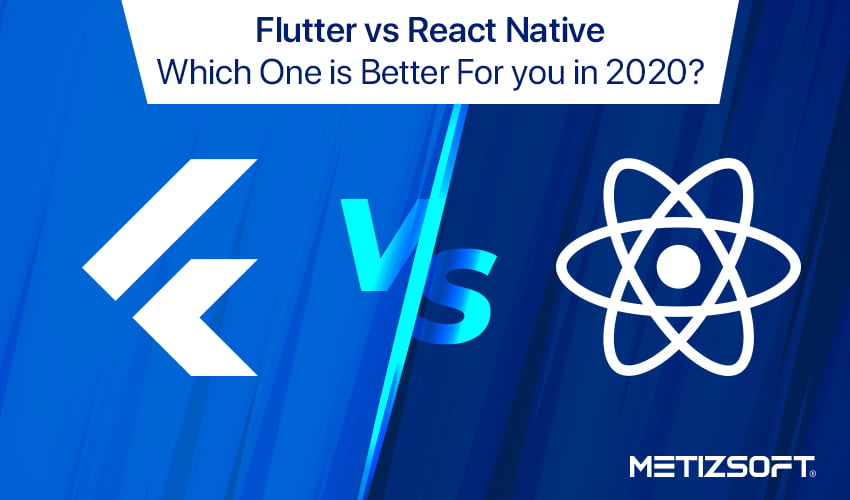
Table of Contents
What is a Mobile App?
As we know, mobile apps are becoming popular with each passing day. With the advancement of technology and increased mobile usage, mobile app development is a great idea to give your business a chance to grow globally, digitally, and smartly, even within a short span of time.
Do you also have a plan in your mind? Do you also want to grow your business but are not sure which technology to choose? If yes, then it is okay, take your time because better late than never choosing a platform in a hurry and regretting it later.
In this article, we will do a detailed comparison between Flutter vs React Native.
Before we begin with the comparison, we will first know a little about both of these best cross-platform development frameworks for you.
So let us give you an overview of both frameworks.
What is Flutter?
Flutter is a cross-platform development tool. It helps building high-end mobile apps for both iOS and Android using a single codebase to meet specific business needs.
It works with extensive code and is a primary choice for developers and organizations around the globe.
Flutter app development is ideal for building beautiful, natively compiled applications for mobile and web users. The first version of Flutter was released in May 2017.
What is React Native?
React native is an open-source cross-development framework for mobile app development. It is one of the best cross-platform development frameworks used to develop applications for Android and iOS.
It offers faster mobile development and efficient code sharing across iOS, Android, and the Web with excellent quality services.
React native app development offers many benefits for iOS and Android, making it a great cross-development platform. The very first version of React Native was released in March 2015.
Now, as we know in brief about both of these platforms, we will come to the cross-platform mobile app development comparison part.
Now, let’s compare Flutter and React Native based on the following factors.
- User Interface
The user interface includes users who use your app. UI builds a connection between your app and your customers, so providing an excellent user interface is very important from a business point of view.
User interface influences and increases customer retention. You will find a massive gap between these frameworks.
React native is based on native components, whereas Flutter works with proprietary widget sets for customized UI design that gives dynamic and native support.
However, there are a few drawbacks and areas where the app lacks a few components, resulting in a compromised user experience.
React Native wins and takes the credit for providing a better user experience among the two.
- Ease of Installation
No matter the framework, installation should always be easy without too many puzzles and complicated steps.
You can install Flutter by downloading the binary for a specific platform from its website or GitHub. In OS, one has to download the flutter.zip and then add it as a Path available in the system.
On the other hand, in React Native, the framework is installed using the Node package manager (NPM). Developers familiar with JavaScript generally find the installation of React Native very simple, whereas other developers find it a little tricky.
You can install React native easily by just using package managers; therefore, React Native is leading here.
- Programming Language
A programming language undoubtedly plays a very crucial role in building an application. The programming language drives your app as you wish it to be.
Flutter works on a programming language named Dart. Google developed it in October 2011 by the designers Lars Bak and Kasper Lund.
React Native, on the other hand, lets you build a mobile application using JavaScript as its programming language. Because of several opportunities, JavaScript has become quite popular among developers.
So, if you are well-versed in JavaScript, then React Native is an ideal choice for you.
- The Architecture of The Platform
When choosing between Flutter vs react native, considering the technical architecture is advisable.
Flutter uses the Dart framework, which has many built-in components. So it’s bigger and doesn’t require a bridge to communicate with the native modules. Dart uses Skia, a C++ engine with protocols, compositions, and channels.
Flutter also uses skin. Flutter does not provide a roller that continuously rolls the latest skin into that project, so developers must perform the actions manually.
We conclude that Flutter has everything needed for app development in the Flutter engine.
- Documentation Processing and Toolkit
Documentation processing is a very tricky and tedious part of any cross-platform development.
Flutter is very good at documentation as it makes the developer’s life easy by allowing them to use it while documenting their applications.
React native, on the other hand, is not well organized. The framework deletes the components that are helpful in making the process smooth. Hence, it is clear that tools bring tough competition between these frameworks.
Here, Flutter is the clear-cut winner. It is considered the best when compared to Flutter vs React Native.
- Scalability
Scalability is one of the important aspects for companies that want flawless mobile apps. When we compare Flutter vs React Native, the competition looks quite difficult.
The alpha version of Flutter is not a suitable option for large products.
The newly launched Flutter beta 2 version offers some impressive features for developers. Large community support for React Native and its consistency have made it a more popular and reliable framework.
Flutter in the case of stability is still struggling to make a mark and therefore, React Native is a winner here.
So, which framework will suit you the most? Flutter vs React Native?
Both of these have their own pros and cons just like any other framework. Both of these are among the best frameworks.
This guide might have given you insights about which framework is suitable for what feature and it will help you decide which the best framework is for you.
The decision depends completely on you but if you ask us, we will give our votes to React Native due to its various features.
Hurry, Get in Touch With Us!
Metizsoft Solutions is a cross-platform mobile app development company with specialization in both frameworks.
We offer effective mobile app development services in whatever framework you want. If you are looking for a trusted cross-platform app development company.
Metizsoft Solutions is the right place for you. Get in touch with us to know more.
Recommended Reading:
- Top Benefits of Hire Remote Developers During Covid-19
- Top iOS App Development Trends that will rule in 2020.
AboutChetan Sheladiya
Related Posts
Top 6 iOS App Development Trends that will Rule in 2023?
Technology continually evolves. It always brings something new with time. Therefore, with ever-changing technologies, you need...
React Native is the Future of Mobile App Development at Shopify
After many successful years of native mobile development, Shopify recently decided and made it official that they’ve decided...

